#and the prefix meta- means
Text
extremely tempted to name my newest thing just like. something so deeply uninformative at first glance but that is also actually a ginormous spoiler/so very on the nose re: plot, except i'm not sure anyone but me 1) would ever know how much of a Dude. moment it is (because that realization relies on some A Language/Culture I Made Up knowledge and idk how much of that i can actually include) or 2) would truly appreciate how funny i am when/if my little joke IS revealed/comes up, which is imperative. it's not funny if it's not funny. and on their own it's like. yeah that sure is a title i guess technically. WHICH. even at best it will be late in the game where i can drop the hee hee hoo hoo. people will see my joke and there is No Way they can get it. what if they pass by the story of my dudes because the title sucks
#wip blogging#two main contenders for Um Hey Like. Why titles are:#1. A Hero#and 2. Being a Story#BECAUSE. theyre both like.#ok so the two main characters are lan and ehir but you dont know ehir's name until Way Later for like half the book he's going by sacha for.#reasons. stuff. Plot. but the story is actually abt figuring out whatever the hell is going on w him#hence option number 1! you would think it's referrong to lan (the ostensible hero) but actually it's just a Very shitty pun#option number two is the same level/grade of Very Shitty pun but it has LAYERS.#also the subject is the same it's still based around ehir's name#in my made up language ''eh'' is a prefix meaning ''being'' or ''to be'' and ''hir'' means ''story''#so. badum tss second verse same as the first#so it'd b a story called a story abt the story of Some Guy named a story who also has a lot of rumors(stories) floating around that need to#be corrected AND [spoiler] how the god of stories (not me but also. yes me. hee hee hoo hoo) fucks up his day (everything)(but you dont know#that until Way Later when he [spoiler2] dies(that story ends) and then subsequently Does Not Die (retelling; it isnt the same but the story#(and him A Story) is still there) and also some other stuff.#that one is again an extremely involved on the nose very shitty pun. theres actually more layers even but i'll shut up about it.#way too much meta there.#my third option is ''from the mouths of birds'' which is. MOSTLY not a shitty pun.#or well it isnt a pun at all actually it's more a reference. it's the first part of ehir's culture's version of ''once upon a time''#or like. the equivalent. bc yknow how birds can imitate things and pass them along but they can get warped or altered in the process but#something still started the chain somehow and each new iteration still both leads back to the first one and also is in and of itself moved#forward so it's a bunch of new things it's one long thing it's different every time it's the same thing even if it isn't#all of these are one(1) joke/spoiler just approaching it in different ways and in various degrees of Dude#and. again there is. Even More to the hee hee of it all but i want to sit on those.#ftmob is what i'm leaning towards. ish. for more Joke Reasons and also it's vaguely more like a reasonable title#but. 🤔 Its Not A Shitty Pun.......... it does have to DO w a shitty pun but that's not the same...#anyway
0 notes
Text
Breath as Influence and John in the Epilogues
Breath is probably one of the better understood aspects. “What is it?” someone asks – and the whole fandom is like, “Oh, Breath is about freedom and wind and detachment.” Which I don't disagree with. But I think most people miss a key piece of it – Breath as influence.
I'm no seasoned classpector, but I am a Mage of Breath, so I feel like I have a deep and personal understanding of Breath, particularly because of how it has manifested in my life. Yeah, I know, claiming I'm an authority on the subject because of my self-imposed alignment within a fake typology system makes me sound like an asshole. But I'll have to ask you to trust me, because if I start talking about my own experiences, I'll sound like even more of an asshole.
Anyway, let's kick this off with the official description of Breath, per the Extended Zodiac:
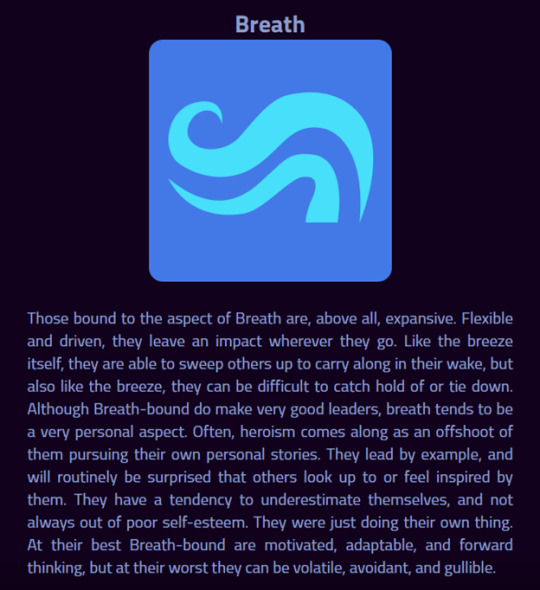
In summary: the Breath-bound are flexible, driven, detached, and maybe a little self-centered. Also, other people tend to get caught up in their personal development, which tends to make them good leaders. But the most important thing here for the point I'm making is this:
others ... feel inspired by them.
This word, inspired, has been rolling around in my brain for the past few weeks, because of its connection to Breath. Hey, did you know that “inspire” comes from Latin spirare, meaning "breathe"? And if we include the Latin prefix in-, it becomes "breathe into."
The Breath-bound have an ability to breathe into, or inspire others. They're not aware of it – after all, they are just living their lives for themselves. But wherever they go, they are inspiring people. Or, more accurately, they are influencing people. Actually, the influence of Breath goes beyond just people. I could even get meta with it (and I will. I apologize in advance). But let's start small for now.
Tavros Nitram
So, Tavros. Page of Breath. Pretty much all of Tavros's contributions to Homestuck as a story happen as a result of someone doing something to him. Vriska paralyzes him, which kickstarts the whole FLARP cycle of revenge arc. And again when the truce is broken in Act 5 Act 2, it is because Vriska kills Tavros. If this doesn't sound like influence to you, you're right. Tavros has very little influence. He's a Page, after all, and if there's one thing I know about Pages, it's that they're weak as shit until they reach their "true potential," which is pretty much always something stupidly overpowered. Y'know, like Jake overpowering Jade's first guardian powers. That was pretty batshit, I'd say.
But Tavros's contributions don't end there. He actually does reach his true Page-y potential right at the very end of Homestuck, when he gathers an army of ghosts – honestly, probably every single ghost in the furthest ring – by just talking to them. Was this something of a punchline to a very long joke? Probably. But it is also a pretty good example of the kinds of things Breath players typically do.
On a meta level, though, this argument kind of falls apart, because... As far as I can tell, the army of ghosts doesn't really do anything. Nothing important, anyway. Lord English's defeat is pretty much entirely at the hands of John, Dave, Davepetasprite^2, and alt!Calliope in the body of Jade, as described in the Epilogues. The ghost army just isn't relevant, in the end.
But you know what is relevant? Vriska.
Half the people reading this just groaned, I can feel it. Why are we talking about Vriska, a Light player, on a post about Breath?? I hear your question and I raise you this: Why the fuck is Vriska so obsessed with Breath players???? Personally, I think it's because she has an innate sense for their passive ability to decide what's relevant.
But before we get into Vriska, let's talk about John.
John Egbert
John, Heir of Breath. The protagonist of the story. In the context of my thesis of "Breath as influence," isn't it interesting that the protagonist is a hero of Breath? And even beyond that, he's an Heir, a class typically interpreted as "becoming" their Aspect, or "inheriting" it. If you find my argument compelling, you could even say John is the influence that drives the story. Which is exactly what a protagonist does - after all, what is a story without a protagonist?
This question is actually addressed in Homestuck, kind of. At some point in Act 4, Terezi manipulates John into visiting his denizen early, which gets him killed. The story is left without its protagonist, and progress grinds to a screeching halt. Jade doesn't enter the Medium and presumably dies. The reckoning never happens. Dave and Rose are trapped in a doomed timeline. They lose contact with the trolls. For what is a world without the breeze, without air, but a place of complete standstill? The story needs John to continue. Okay, it needs Rose and Dave and Jade just as much. But it's interesting that the story makes a point of John's death being the turning point that makes this particular timeline doomed.
Okay, sorry for the wait. It’s Vriska time. Vriska's driving motivation is to be relevant. She does everything in her power to steal the spotlight, which may or may not be related to the fact that she's a Thief of Light. Again, I'm not an experienced classpecter. I only really have a surface level understanding of Light. But I'm getting off topic here.
In Act 5 Act 2, Vriska starts talking to John. Why? Well, partially because she wants to compete with Terezi, who is talking to Dave. But there's also the fact that she wants to be the force responsible for Bec Noir. And also for John reaching god tier. And everything relevant really??? She's really fucking good at being relevant, I'll give her that. Or at least presenting the illusion of relevance, but that's a big topic that I think I should save for another day. Another essay, maybe. The point here is, John has a tremendous amount of influence over Things That Happen just by existing, and Vriska knows it. Maybe she torments Tavros because she senses the same sort of potential in him, but that's probably a stretch.
In any case, this is baby shit. There's better evidence than this. Let’s talk retcon powers.
You could argue that the retcon powers are separate from John's abilities related to his classpect, and on some level you'd be right. But in a game that "knows" everything that is going to happen, I have to question if extraneous powers like this are taken into consideration when Sburb "decides" what classpect it gives a player. I feel similarly about Jade's First Guardian powers. Teleportation is a pretty space-y power, in my opinion. And definitely one that... "breaks rules," I guess. Among all the other things First Guardians get to do. Once again, I'm no classpector. But Jade getting access to First Guardian powers upon reaching God Tier strikes me as very Witch of Space-y. I feel similarly about John's retcon powers - they strike me as very Heir of Breath-y.
And not just because I view Breath as influence, though that is definitely the most obvious way the retcon powers could be interpreted as Breath-y. Even on a surface level, they're pretty Breath-y. When John first talks to Roxy, he gives a whole spiel about everything he's been to up until this point, most of which is obscured by "blah blah blah." But little phrases come through occasionally, and when he starts talking about his brand new retcon powers, he uses the phrase "UNSTUCK FROM CANON." Which sounds a lot to me like "freedom from the narrative." But maybe more telling is the fact that John's quest as an Heir of Breath requires that he use his retcon powers. Getting rid of the oil, freeing the fireflies - his quest as established at the very beginning was always intended (in universe at least; I can't speak for Hussie's intentions) to be solved by his retcon powers.
So retcon powers are at the very least Breath-adjacent. What’s that got to do with Breath as influence? I’m sure you see where I’m going with this. Retcon powers are basically the ability to do whatever the fuck you want to any point of any timeline. I’d call this influence but I’d sound silly, actually. It goes way beyond influence. It’s way less subtle. I guess you could call direct intervention like this influence at its most powerful. Well, almost. There’s one step above this that John never really taps into. Which brings us to...
The Epilogues
For better or for worse, I fucking love the Epilogues. I think Candy, on its own, is a fantastic and surreal deep dive into a mind high on depression. And as for Meat, I’m an absolute sucker for metafiction and narrative fuckery. I eat that shit right up. My favorite anime is Princess Tutu, etc., etc. This is your warning: Yes, this section will contain evidence toward my claim that Breath is influence. It also doubles as an Epilogues analysis. It kind of turns into one at the end. Sorry, but I needed to get it out of my system.
So, in case you missed it, the step above retcon powers that John never taps into is direct narrative control, like we see Dirk engaging in throughout the Meat side of the Epilogues. The fact that Dirk is revealed to be the narrator of Meat begs the question: who is narrating Candy? It’s never outright stated, but it’s probably alt!Calliope. Unlike Dirk, alt!Calliope doesn’t have an agenda, as far as we’re aware. So why is Candy so fucked up and weird? Why is everyone out of character? I know this comes as a shock, but: it’s probably John’s passive influence over the narrative.
Before the Epilogues even begin, John’s been wasting away in his house all day, every day. He’s depressed as hell. Sort of dissatisfied with how artificial and "perfect" Earth C is. Some have suggested he also feels disconnected from the post-retcon versions of his friends, and I think this holds some merit. It would explain why he feels disconnected from reality in Candy.

(Candy, 11)
Depression colors your view of reality. It darkens some parts, brightens others. People who look happy will appear so to an unsettling degree. Fucked up things will appear even more fucked up. Depression ups the contrast, if you will. And that’s pretty much what happens in Candy. Jane’s pretty bad in Meat, but she’s like a billion times worse in Candy. Jade causes some awkward moments in Meat, but she is pretty much a sex pest in Candy. The positive parallels are a bit harder to find, since Meat pretty much sucks too, but you could speculate that John perceives Rosemary to be happier together than they actually are, so they’re, like, uber happy together in Candy and raising a daughter and shit. It is John’s warped perception of reality that in turn warps it beyond recognition.
This isn’t just me theorizing, by the way. There’s pretty compelling evidence to suggest that this idea is accurate to what is happening. It’s pretty clear in a conversation between (Vriska), who has just arrived on Earth C via the black hole in the furthest ring and her descendant/clone Vriska (aka Vrissy in HS:BC). The two of them stare up at the sky, pointing out clouds and what they are shaped like, when (Vriska) has a realization.
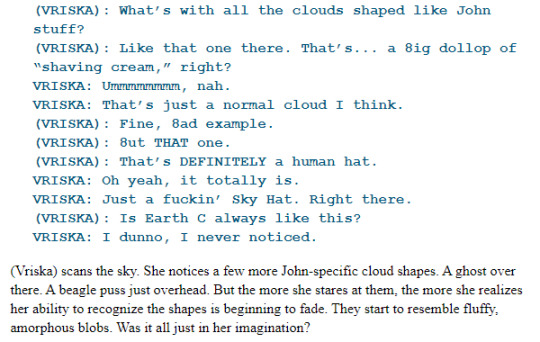
(Candy, 37)
John’s influence over the reality is so absolute, even the clouds bend to his will. I think Vriska only notices it because she’s a new arrival to Johntown. It isn’t long before she’s absorbed into the John-ness of the timeline. And then, she goes on to say exactly what I’ve been saying this whole time. Remember earlier, when I said Vriska knew that John had an incredible amount of influence over Things That Happen?
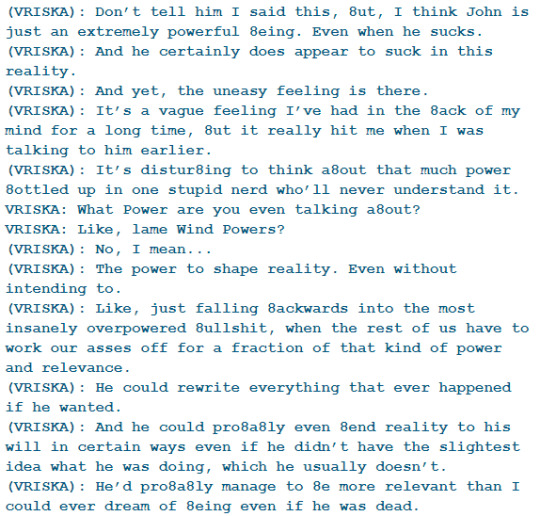
(Candy, 37)
Yeah. That wasn’t speculation.
The last thing she says, though, that he’d be relevant even if he was dead, is actually a reference to Meat. So let’s talk about it!
As we know, Meat is narrated by Dirk. Dirk’s narrative style is a lot of fun for me, personally. He’s sassy, kind of an asshole, and has no time for bullshit. The second John puts that meat in his mouth, he gets to work, pulling the strings of his little puppet show.

(Meat, 1)
He wastes no time putting words in John’s mouth, writing him out of the story of Earth C as quickly as possible. It’s almost with a sense of urgency that he pushes John to complete his mission. Which is probably necessary, seeing as the sanctity of canon relies on him going back to tie up the loose end that is Lord English. But I think Dirk has ulterior motives. I don’t think Dirk has the ability to impose his will so overbearingly with John around, because for some reason, John’s power of passive influence prevents him from doing so. Is John more powerful than Dirk, even after his ascension to Ultimate Selfhood? Maybe. I certainly think so.
But John’s pretty gullible. He’s easily influenced. He doesn’t have the same safeguard around his own mind, for some reason. Or maybe he does, and it’s just taken Dirk this long to crack him? This is speculation at this point. Not important.
So Dirk eventually kills John. Why? Well, first of all, it’s harder to control the narrative with him around. Though I speculate that’s not very important to Dirk anymore since he fucks off to who knows where around when John comes back. I think, more likely, Dirk finds John’s influence on the narrative unsavory. I mean, just look at Candy. What an absolute disaster of a timeline. Maybe his awareness is such that he knows that letting John live will result in a similar degradation of his friends’ personalities as he knows them. I can’t really say one way or another. It’d explain why he wants John’s body on the ship with him, though. Y’know, to make sure he never gets revived. And yes, he wants him on that ship. He pretty much tells Terezi outright to captchalogue his body before convincing her to join him.

(Meat, 35)
There’s one problem, though. I don’t think John being dead even erased his influence on the narrative?
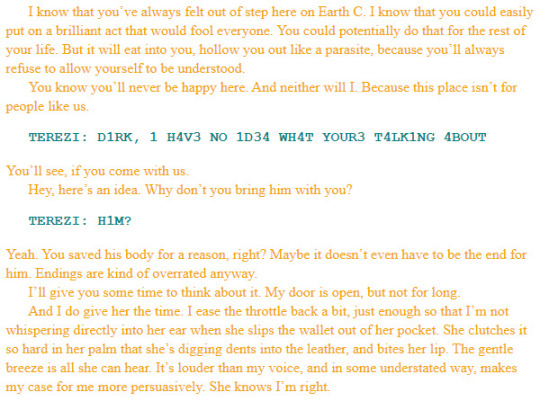
(Meat, 36)
Right there at the end:
The gentle breeze is all she can hear. It’s louder than my voice, and in some understated way, makes my case for me more persuasively.
I don’t think there’s any other way to read this than the breeze representing John. This is a literal manifestation of John’s influence. I guess it could be symbolic – like Terezi doing a “what would John do?” kind of thought process. But I dunno, Dirk doesn’t strike me as that kind of narrator. Besides... It’s a little too on the nose. Say what you will about the Epilogues, but I believe a great amount of care went into them. This certainly isn’t a throwaway line.
Conclusion
Okay, sorry. I really went off the deep end into Epilogues Analysis Land there. You may have noticed that I didn’t talk about Homestuck: Beyond Canon. That’s partly because I haven’t gotten there in my reread, but mostly because I’m not yet convinced that it has – or will have – nearly the level of plot consistency of its predecessors. We’ll see, I guess.
In any case... Breath as influence, huh? There’s probably more evidence for this hidden away somewhere. I probably could have talked about Rufioh. I didn’t want to though. I also probably could have pointed out the word inspire from the Extended Zodiac thing and called it a day, but instead I blacked out and wrote this. Weird!
If you read all, uh... *checks word count* 2.7k words of this??? Jesus fuck. If you read all this, thank you for reading. I’m open to feedback! I’d love to discuss some of this more! Especially the Epilogues stuff. I have a million thoughts. Bye!
#homestuck#homestuck epilogues#john egbert#tavros nitram#dirk strider#vriska serket#homestuck analysis#homestuck meta#classpect#classpect analysis#breath aspect#mine#will i ever write that vriska essay? the world may never know#thx yall
150 notes
·
View notes
Text
I can't believe my fic has *current number of chapters* amount of chapters! Wow isn't that CRAZY!?
read it here if you want, idk ->
175 notes
·
View notes
Text
PSA on single-character Chinese names
The usage of single-character names BY THEMSELVES is considered a little odd in modern Mandarin. Multi-character names are fine, for example, Wangji is fine by itself, but if you’re referring to him by birth name, you wouldn’t usually refer to him as JUST Zhan. You will have to use his full name (Lan Zhan), or add a prefix or suffix to the name, like A-Zhan, or Zhan’er. Unfortunately, the Netflix subs of CQL tends to omit the prefixes / suffixes from the names, thus translating A-Ying, for example, as simply Ying. This is an inaccurate translation.
There ARE occasions when single-character names may be used by themselves. For example, when JFM is referring to WWX early in CQL while talking to LQR, he calls him “Ying” and in LWJ’s letter to WWX, inviting him to JL’s hundred day celebration, he also refers to him as just “Ying” near the end of the letter (see below). However, this is somewhat formal dated usage, and is no longer common in modern Mandarin. I believe this is part of a larger evolution of Chinese language away from a more single-character focused lexicon, which I will explain below.

THE EVOLUTION OF CLASSICAL TO MODERN CHINESE
The modern spoken form of Mandarin evolved from an olden form of written Chinese, which I’m going to refer to as classical Chinese for simplicity’s sake (I believe historians actually have different names for different eras of ancient written Chinese). At the same time though, modern Mandarin is VERY different from classical Chinese. Classical Chinese is pretty much like... an entirely different language from modern Mandarin. I’m going to quote this meta which I encourage you guys to read in full for an analysis on LWJ’s speaking style:
文言文 wenyanwen / classical/literary Chinese is related to but distinct from modern Mandarin… Modern Mandarin Chinese as we know and learn it today in classrooms is something that didn’t really get codified until the 20th century… classical Chinese can be summed up, like most things in Chinese, with a four-character idiom: 言简意赅 yanjianyigai. Broken down, we get:
言 yan - words, speech
简 jian - simple, brief
意 yi - meaning, intent
赅 gai - complete, full, comprehensive
Classical Chinese (which is heavily focused on single-character root words, thus condensing a lot of meaning into a relatively short sentence) was largely a written form of Chinese used by elites. Historians do not seem to believe that people spoke classical Chinese, but a vernacular form of Chinese which we don’t have record of. Typically though, languages tend to become increasingly diverse over large swaths of land, which leads to the emergence of dialects native to different regions. As a result, people from different regions may not actually understand each other.
However, China was united as a kingdom over vast swaths of land for many periods in dynastical history. It had a political system where magistrates stationed in even the faraway reaches of the kingdom reported to the emperor and his cabinet of ministers in the capital. As such, if you wanted to be a magistrate, you would have to learn this written form of Chinese, and take the imperial exam to be selected for the position. As a magistrate, you would be expected to correspond with officials from other regions in this written form of Chinese. This written form was thus able to bridge the differences in spoken Chinese.
But according to my Chinese teachers!!! (Disclaimer: they are high school language teachers, not Chinese history professors, so I cannot completely guarantee the historical accuracy of these claims,) When modernization happened, transportation became more advanced and urbanization became more and more of a thing. Thus, society saw a greater intermingling of people from different regions who couldn’t necessarily understand each other in spoken Chinese. This necessitated the emergence of a new common spoken tongue. Modern Mandarin, which is often referred to as putong hua (lit. common language), was thus born.
THE MOVE FROM SINGLE TO MULTI-CHARACTER WORDS
According to my Chinese teachers (see previous disclaimer again), modern Mandarin basically moved away from the single-character focused lexicon of classical Chinese, towards increased usage of multi-character words. For example, the modern word for “conflict” 战争 is made of root words 战 and 争 both of which rooooughly mean “conflict” as well. In a classical lexicon, the root words would likely be used by themselves, but modern Chinese mostly uses multi-character words.
And this, according to my Chinese teachers, was to improve the understandability of spoken Chinese. Chinese language has a GREAT NUMBER of homophones, which can get REALLY FUCKING CONFUSING. The Zhan (战) in “conflict” sounds exactly the same as 站 (to stand) 占 (to occupy) 湛 (as in Lan Zhan), and more. As such, while the root words 战 and 争 may carry the intended meaning perfectly well in writing, in speech, they individually sound like a bazillion other words. Which thus necessitates these multi-character words. 战 may have many homophones, but 战争 has a great deal less homophones.
So why do we generally not do single-character names in speech anymore? BECAUSE IT CAN GET REALLY FUCKING CONFUSING. Like if you wanted to say something as simple and functional as “go to Zhan” (去湛那边), the Zhan of his name (湛) is a perfect homophone for 站 (to stand), so it literally just sounds like “go stand there” 😭😭😭 At least if you use his surname (Lan Zhan), a prefix (A-Zhan), or a suffix (Zhan’er) it becomes a whole lot clearer that you’re referring to a person.
THE TLDR;
This is a very long and roundabout way to say: please don’t replicate the Netflix subs in your fics. If you’re referring to someone with a single-character name, add a prefix or suffix to the name, like A-Cheng, or Cheng’er, or else use the full name, Jiang Cheng. Multi-character names are generally fine, for example, Wanyin, Wangji, or Xichen are all fine. Wuxian seems to be a little bit of a grey area. It does not seem to be used by characters in the novel, probably because it sounds like 无线 (wireless), which is the reason why the Chinese fandom likes to refer to him as “WiFi” 🤣
539 notes
·
View notes
Text
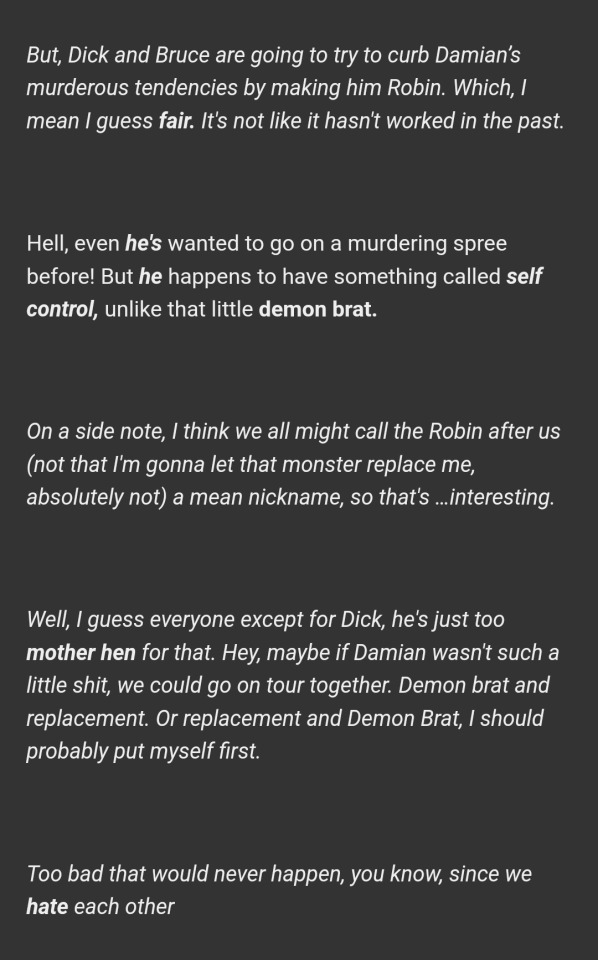
Well, I guess everyone except for Dick, he's just too mother hen for that.
The only comment I have on this is the amount of times I've seen the word "I," even though this is a third-person fic; it should be "One." Like, instead of "He failed. I would assume that was obvious." It would be, "He failed. One would assume that was obvious."
I'm sorry if this comes off rude, it's ment to be constructive criticism, I just really can't unseen it. I definitely recommend the fic though! I love it!!
Hope you enjoy the read, thanks for reading my word-vomiting ramble!! <(_ _*)>( ゚ 3゚)
#dc#ao3#tim drake#fanfic#i need more fics like this#funny#damian wayne#tim and damian#tim and jason#robin damian#robin tim drake#metahuman#meta tim drake#this is like ch.7 btw#i can't unsee it#im srry#constructive criticism
26 notes
·
View notes
Note
Hello hello, i just wanna say i absolutely love your Galacta Knight and Meta Knight comic it RUINED my brain in the best way possible.
you made a very cool language that i would love to figure out how exactly it works and the grammar behind it and just Everything you’re willing to share. I’m being sent into brainrot and i’m Living for it!!!!
ohhhh thank you thank you soo much! i'm so excited to hear i am infecting other people with my brainrot! truly the highest of praise, thank you!
I don't have 100% of the language figured out or anything and it is very much a work in progress (i tend to iron out + develop new things as i need them), but it- like all languages- is very tied into the culture of its speakers!
here's one of my personal favourite parts, the 'Reverse Possessive':
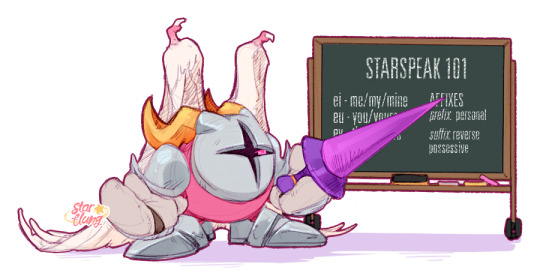
my version of Starspeak lacks pronouns and has limited possessives: one for yourself (ei), one for someone who you are actively addressing (eu), and one for Anyone/Anything Else (ey).
if you needed to refer to someone else in particular you would use their name, rank, or a relationship designator. Celestial culture is extremely hierarchal and formal relationship designators are very precise, which means they are quite varied and can work almost as titles or second-names
with only one word for all versions of a possessive, the location of it impacts the entire function of a phrase. to explain this I'll use a word I've previously introduced, Vaýtita, which also happens to be a relationship designator.
you could use this word on its own, like a name, though very commonly it is used with a prefix possessive; ei Vaýtita (my Vaýtita). you could also refer to someone else's gravity the way you might refer to a spouse or partner, eu Vaýtita or ey Vaýtita (your Vaýtita // its Vaýtita).
reverse possessives function a little differently, and usually tie into hierarchy. in Starspeak using the suffix -ei translates best to "which possesses me."
so when adding it and making Vaýtita-ei, the Vaýtita is put into a position of possessing the speaker, and it translates as the Gravity which possesses me.
you would only really say it this way if you were insanely fuckin' serious about the person you were referring to, because it implies that you are wholly and completely consumed by this force in your life. there are however other designators where it is much more common to use a reverse-possessive to identify that you are, in terms of relationship hierarchy and responsibility, deferent to that person
for instance, the central rank of a Star System, Ílioz (the Sun) is quite frequently used with the reverse possessive by all orbiters or lesser stars. they would say Ílioz-ei (the Sun that possesses me) out of respect and/or love and/or fear
you could similarly add the suffixes -eu or -ey if you knew the formal relationship of the person/s you were referring to (ie: Ílioz-eu, the Sun that possesses you), or even derogatorily
this is getting long so i will wrap it up here, but if you'd like to know anything else please please ask!! i obviously delight in talking about it and could go on for paragraphs more, i just don't want to make too huge of a text wall! but i would be more than happy to answer any other queries about any words or specific phrases or grammar or so on!!
thank you again so so much for your interest and for asking 🥺🥺💝
#starspeak#galacta knight#my art#asks#i am trying so hard to keep these at a moderate length but it is so hard because there's just... so many words to say lmao#if you read this all thank you so much 😭#and if you want to ask more anon then don't hesitate!!! please do!! i am thriving on anyone in the universe being interested in this tbh#my headcanons and worldbuilding
55 notes
·
View notes
Text
Mando'a is for Lovers, Part 1
So, you want to write a Mando romance? (Sure, we all do!) And you think conlangs are Neat and want to include Mando'a for some flavor? I cannot blame you, friend! They ARE neat! But you're getting kind of stuck because Mando'a seems to be like 80% made up of military or weapon terms and/or insults?
I AM HERE TO HELP.
But I'm gonna have to do it in multiple posts because um. I might have a lot to say and am really kind of a language nerd as it turns out.
SO this one will JUST be some helpful hints for specific words and phrases that could be useful in trying to write Mandos being lovers not fighters (at least at the time.)
Please let me know if you'd like me to write more of these (grammar basics, handy hints, translation help etc.) or to expand on any points, me and my ADHD hyperfocus would LOVE TO HELP.
(Note: I use mainly Mando'a from mandocreator.com because I like their online tools the best. A "dialect" of Mando'a is basically "one particular conlang hobby group that has made up some words that don't exist in the official sources." Other Mando'a dialects are available.)
Anyway, so, first thing:
You can't just write an English sentence, look up each word in a Mando'a dictionary, and then string those words together. Translation doesn't work like that. What you get will almost always make no sense - like those things you see when someone runs a sentence through Google Translate a couple times and then puts it back to English. This is doubly true because Mando'a was created to give flavor to books and video games and doesn't have anywhere near a complete dictionary, so a lot of the time you won't even be able to FIND the word you want.
This is how you get characters calling someone "my to hold in the heart forever."
There are many conlang nerds (myself included) who would happily help you figure out ways to say what you want to say, but for a shortcut:
Look below the cut for help with terms for: love and marriage, beauty/hotness, pet names, and compliments. Bonus: some vocabulary for getting frisky.
Love and Marriage
If you want someone to say "I love you" (the VERB form of "love"), use kar'taylir darasuum which means "to hold in the heart forever." You will need to CONJUGATE this like so:
I love you: ni kar'tayli gar darasuum
You love me: gar kar'tayli ni darasuum
I love him/her/them: ni kar'tayli kaysh darasuum
If you want to call someone "love" or "my love" ("love" as a pet name/endearment), the word to use is cyare (loved one/beloved) or possibly cyar'ika (darling/sweetheart). Your spouse/committed partner is your riduur. To get married, you say/swear/vow the riduurok. (NOTE that the riduurok is not 100% equivalent to a modern US marriage but this is the vocabulary post not the Mando Culture Meta post. Hit me up if you want me to make the Mando Culture Meta post.)
If you have read more than 2 or 3 Mando fanfics you likely already know about the riduurok but here are the vows, for completeness:
Mhi solus tome, mhi solus dar'tome, mhi me'dinui an, mhi bajuri verde. (We are one when together, we are one when apart, we share all, we will raise warriors.)
If you want to talk about love as a CONCEPT (the noun form of "love") you're going to have to reword it somehow, because Mando'a doesn't have a canon word for that. A few suggestions:
1) reword the sentence to use the verb form
2) use another word, like guuror (to be fond of/to like/to hold affection for). Mando'a also has the very handy intensifier prefix ori-, so you could also say ori'guuror to mean "to like a lot/to be very fond of/to hold great affection for."
3) Think of another way entirely to say the thing you want to say, one that there ARE words for. (You have to do this a lot in Mando'a honestly.)
4) Use a metaphor. Mando'a is a very poetic and metaphorical language where the same words take on different meanings based on context.
5) use words relating to knowledge and remembrance. In Mando'a the concepts of love and remembering/knowing someone or something are VERY closely related.
Attractiveness
A couple related concepts here. Also note that if you are writing Mandalorian characters, they will have Mandalorian standards of attractiveness, of which physical appearance tends to be a lot lower-ranked than in modern Western culture. When you are part of a historically nomadic warrior culture in which most people wear armor all the time, you're gonna care a lot less about what they look like than what they act like and how they ARE, as a person.
Beautiful: mesh'la
Very beautiful: ori'mesh'la
More beautiful: mesh'lashya
The most beautiful: mesh'lane
Note: for all these adjectives, you can add ori' to the front to make it "very [thing]", shya to the end for "more [thing]", and ne to the end for "most [thing]".
Attractive (not relating to physical beauty but attractive as a person for other reasons): copyc
Don't mix copyc up with copik'la, which means "cute" but should only be used about animals and small children, not adults. (unless it's a pre-negotiated kink thing but let's save that for the advanced lesson.)
See also the section on compliments for other qualities Mandos find appealing and might use to sweet-talk someone.
Pet Names
cyare (love/beloved) and cyar'ika (darling, sweetheart) are the classic go-tos here. If you are married you can call them riduur (spouse/life partner). You could also use ner kar'ta (my heart), which I would argue works well in Mando'a since the way you tell someone you love them is literally to tell them that you hold them in your heart forever. The heart is actually very significant in Mandalorian culture generally; the elongated hexagon you see used in their designs and in the chestplate of their armor is called the kar'ta beskar (beskar heart) and is a culturally significant symbol.
A note on "-ika": using the suffix "-ika" forms a Mando'a diminutive meaning something like "little [thing]" with an affectionate connotation. Hence cyare (beloved) becomes cyar'ika (sweetheart, darling.) You can do this with names: you add -ika to the first syllable, so Jango would be Jan'ika, Din would be Din'ika, Boba would be Bob'ika. (Note- you can fudge the "first syllable" thing to make it sound better and be easier to say. "Bob'ika" flows better than "Bo'ika" but I think it's easier to say "Gro'ika" for Grogu than "Grog'ika.") Note that -ika is a lot like the Japanese -chan in that it generally connotes something young and cute more than something adult. So don't just deploy it at random. An adult calling their adult lover "-ika" is kind of like, say, calling Steve Rogers "Stevie" or possibly even "Stevie-poo" - it definitely can happen but there's a certain vibe to it that you might not always want. But you could still use it in conjunction with any of these other terms - like you could call someone your kar'tika (little heart) and get the point across.
If the person is being formal/poetic/archaic you might see them use ner runi (my soul), though this would not be commonly used by modern Mandalorians; think of it as like.... using terms from Shakespeare to compliment someone. It can work in the right context but it could also sound really pretentious.
There isn't a canon Mando'a noun that means "treasure" or anything similar, but there are adjectives for "valuable" (waadasla) and "important" (jaonyc) so you can work from there if you're flexible with your phrasing. (You can actually transform words in Mando'a into other parts of speech quite easily--there are simple and standard rules for doing it--but that's another post.)
You'll also see mesh'la (beautiful) used, though I tend to think that Mandos wouldn't emphasize physical beauty so much as other qualities they like, such as:
Other Things A Mando Would Compliment You On
(could be platonic or romantic)
Being mandokarla (adjective) or having mandokar (noun) means basically "having all the qualities that make an ideal Mandalorian." The dictionary definition calls this "a blend of aggression, tenacity, loyalty, and a lust for life."
Having shereshoy (noun) - this is the "lust for life" referred to above, but that's a shorthand translation. Shereshoy is a Mandalorian cultural concept that means "the enjoyment of each day and the determination to seek and grab every possible experience, as well as surviving to see the next day - hanging onto life and relishing it." (a nice parallel for those who ship Mandos with Jedi is to the Jedi concept of being in the present moment!)
Loyal - verburyc (adj)
Stubborn/tenacious/enduring - atin (adj)
Aggressive (not necessarily negative) - verd'yc (adj) (note that "verd" is "warrior" - this is aggressive in a culturally valued way for Mandalorians and might also be used the way you'd use passionate, ambitious, etc in English. OVERLY aggressive/rude/intrusive would be something like "akaa'naryc" which has a connotation more like starting fights/instigating war.
Clever/intelligent - mirdala (adj)
Brave - kotep (adj)
Good - jate, very good - ori'jate, best - jatne.
Ramikadyc - this is one of those words that needs cultural context to really define. Verd is "warrior," Ramikad is "commando," and ori'ramikad is "supercommando" which is the term for elite special forces. Ramikadyc -literally "commando-like" - is defined as "an attitude that he/she can do anything, endure anything, and achieve the objective. A blend of complete confidence and extreme tenacity instilled in special forces during training. Can also be used informally to describe a determined, focused person." (Side note: ram'or means "to attack" and "kad" is "sword" so ramikad likely originally just meant "swordfighter." Possibly because you need more training to be effective with swords and blasters than blasters alone, this came to refer to a more elite class of soldier.)
Kandosii can mean both indomitable and ruthless, while kandosii'la means stunning or amazing.
Strength - a couple different words here. Kot (strength) and kotyc (strong). Dral, which means strong or powerful but can also mean bright or glowing. This leads to the question- how do you know which word to pick when there are multiple ones with the same or similar dictionary definitions?
My go-to is to look for other words that have similar roots, or canon phrases that contain one of the words, and use that to figure out the connotation/flavor/nuance that distinguishes the words from each other.
So for strength - do you use dral or kotyc?
You see the "dral" root in a few places: Dral'Han (the Annihilation - a more literal translation would be "bright annihilation" or "bright oblivion" and it is a reference to the glare of the orbital bombardment of Mandalore), draluram ("bright-mouth", a term for spicy food), and the phrase "nar dral'shya." (try harder/put your back into it.) The "kot" root appears in kote (glory), kotep (brave), kotir (to defeat, to overpower), and alli'kote (a clan's reputation.) From this, it seems like you might use "kotyc" to talk about physical/martial strength or strength that leads to victory or reputation, and "dral" to talk about more innate or existential kinds of strength/power.
Okay, so you can give the sweet-talk. What about the SPICY talk? (because Mandalorians love spicy food? get it?)
Some Potentially Useful Words For Sexy Stuff
naritir (v) - to insert, to put, to place. Note that if you wanted to do an imperative you would add "ke" to the beginning.
narir (v) - to act, do, put
Nar dral'shya! (phrase) - try harder, put your back into it. (We talked about this phrase above when discussing dral. "shya" at the end means "more [thing]" - it's the equivalent of adding "-er" to an English verb - so "dral'shya" here means something like "more powerfully". The "nar" is likely from narir (act/do/put) but could potentially also be from naritir (insert/put/place), so I think that it's quite possible for this phrase to have a double-entendre connotation something like "shove it in harder.")
Words for body parts - (note, in Mando'a you make a word plural by adding -e to the end if it ends in a consonant and -se if it ends in a vowel)
Hand/hands - gaan/gaane
Finger/fingers - cer/cere
Buttocks/ass/rear - shebs (note that this is referring to one entire butt; there isn't a word for a single buttock. "shebse" would be "asses" aka the butts of more than one person.)
Arm/arms - irud/irude
Chest - haalas (there is no word for breasts)
Thigh/thighs - motuun/motuune
Face - troan (this word also means "mask")
Eye/eyes - sur'haai/sur'haaise
Words for THOSE body parts - okay look the Officially Licensed Star Wars Expanded Universe material isn't big on telling you how the GFFA says "cock" so you're going to have to use some creativity here.
Mando'a in general uses gender VERY rarely (in Mando'a, everyone's pronouns are they/them) and when it does, it's mostly in reference to like, animal husbandry. It's generally not going to be very well received to call someone jagyc (male) or dalyc (female) in a sexy context. It's more a medical/scientific thing because in Mandalorian culture biological sex is only relevant for medical/scientific/agricultural reasons and gender only matters in so far as it personally matters to you but is culturally largely irrelevant. Probably Mando OB/GYN vocabulary exists but it was apparently not deemed relevant to the Republic Commando tie-in game and novels that most Mando'a was developed for.
That said, there are definitely crude, Shakespearean-esque jokes including swords and sheaths and such - but these would be considered kind of raunchy and not something that everyone would appreciate. Anyway the words here are:
Kad (n)- sword, saber
Dalab (n)- sheath, scabbard
And if you want some verbs, Mando'a has THREE words for stabbing:
chekar, kalikir, and bikadinir. Chekar means to stab with a small blade - think "to shiv." Probably not the most complimentary metaphor but some people might be into that. Kalikir is to stab with a narrow blade - "to skewer". Bikadinir is to stab with a broad blade - "to run through." The way that these metaphorical uses might be interpreted are left as an exercise for the reader, ahem.
Big (and little) - Big is "ori" and small is "kih". In addition to using them on their own, you can also use them as modifying prefixes, where they CAN mean physically big or small but can also mean the equivalent of "very [thing]" or "slightly [thing.]" Note that "kih" (at the front) is small/little with no context about how you feel about the thing being described, while -ika (at the back) is a way to say "little" with an affectionate, cutesy vibe. So your ori'vod is your older/big sibling, your kih'vod is your younger/little sibling, and your vod'ika is your little sibling (affectionate.)
Hard (and soft)- you probably want muun (hard as in a surface or material) rather than urakto (hard as in difficult.) Soft or yielding is pel; do not use laandur (fragile) as that is considered an insult.
Tight (and loose)- sadly don't exist, but you can probably use novla (closed/shut) and tenn (open) to get the job done here.
Hole - palon is "hole." surdol means "an opening" or "a window," you could likely use this in a sexy context. I've seen people use "shebs'palon" to mean "asshole" but YMMV.
Hot (and cold)- hot is nadala, but this refers to temperature only. Hot as in attractive you want copyc, hot as in physically appealing you probably want mesh'la. Cold is ciryc.
Wet (and dry)- wet is piryc, dry is haast.
Show - tenganaar is "to show" or "to display" with a root from "open hand" (like you're showing something in the palm of your hand.)
Want - copaanir is the verb "to want." Me'copaani? is "What do you want?" or "what would you like?" vercopaanir (literally future-want) is "to wish" or "to hope" and vercopa is a wish or dream. If you say "Vercopa" followed by a statement, it means "I wish that/may it happen that." So like - "Vercopa mhi me'dinui an" would be "I want us to share all." Vercopa can also have a connotation sort of like the one when someone says "I'm manifesting this" - like, you are urging the universe to make it happen for you. The related word copad (noun) is an ambition or desire.
Okay that got really long but I hope it is helpful to someone! Because I've spent way too much time thinking about this. :)
30 notes
·
View notes
Note
Hi, they ask you in you asks quite often and cant find an answer everybody agrees from the internet, what would you call "meta"? like what does it means i hace no idea? is it like fanfiction? or what is the difference ? what does it entails??
Hi! <3
(quick disclaimer that i'm not greek and i'm operating on latin and terminology classes, so if any greek speaking people spot an error, please do correct it!)
The word "meta" itself is a greek prefix and in this context roughly translates to "above". If you talk about the meta-level of something, then it refers to the level above the current one.
To give another example, let's have a look at the name "Metatron". You can divide the name into "meta" and "tron". We already know that "meta" often means above, and the suffix "tron" tends to denote an instrument of some sort, like cyclotron, which is a particle accelerator. So the Metatron is an instrument (used by God) that is above the other beings in heaven.
In fandom context specifically, meta-discourse, or meta for short, is an umbrella term for any discussions that talk about the show from an outside perspective.
When you write fanfiction, you are on the same level as the good omens show itself. You're analyzing stuff from for example Crowley's perspective, so you are limited to the knowledge Crowley has and how he thinks about things. You are in the world.
If you write a meta post, you are discussing the show and the world itself. When I analyze Crowley's actions I am not operating based on what he knows but on what we as the audience know. I am above the show/world and using my own thoughts and opinions.
I hope this answered your question, if not don't hesitate to ask more questions!
24 notes
·
View notes
Text
A fun anecdote about Aune's name —
So, I've had this note on my phone for YEARS that is just a list of names that I enjoy that sound at least vaguely appropriate for a fantasy setting. I pick from it whenever I'm playing a video game and need a name for my character. The name Aune had long lived on this list, but I had yet to use it.
Before I even got my hands on the EA version of the game, I already knew I wanted to play a half-Drow Cleric of Eilistraee. Though I didn't know that I'd be multiclassing her as a bard yet in the full release, I was at least RPing that she was a dancer and musician, as per the Sword-Dancer tradition. I came up with the bones of her backstory — that a tragic and mysterious event that occurred at the time of her birth gave her a unique understanding & intimacy with the forces of life and death, and as such, ending up as a Life Domain cleric felt right to her. This seesawing between two opposing forces would be symbolic of her journey in understanding her own morality and concept of self. (Also, from a meta standpoint, this backstory gave me the space to change my mind and class as a necromancer while still keeping the same character, because I just really love necromancers.)
I also already knew that she would live some time as a slave, as she'd be born to a parent with a decent social status in Lolthite society (so raising a half-elf would be unthinkable). And of course this would play into her personal connection to Eilistraee.
Well, some time passed after that, and it occurred to me that maybe Aune wasn't an appropriate name for a Drow. Obviously at the end of the day it doesn't really matter, but these sorts of things have a way of bothering me until I can't function anymore lmao so I decided to look up a naming resource. I found a detailed list of prefixes and suffixes in the Drow language, along with associated meanings, allowing you to build a name that's suitable.
WELLLLL imagine my surprise when I found:
Prefix Aun—, meaning: crypt, dead, deathly, death
Suffix —aun, meaning: dance, dancer, life, player
*Suffix —e, meaning: servant, slave, vassal
yeah. I was honestly a bit scared lol
but if I had been toying with the idea of playing a different Tav, that discovery IMMEDIATELY put the idea out of my head.
Aune was ~ meant to be ~
*Oh, and in case anyone was wondering, Aune's given name was Aun, but the —e was added on when she was first sold as a slave. In present time, she refuses to drop the letter; she prefers to keep it as a reminder of what she endured and how it has shaped the person she has become.
another fun little detail is that the Aun— is the feminine version of this prefix, and —aun is the masculine of the suffix. I was happy about it turning out that way because Aune is agender
#I've been meaning to share this for ages but I was just too lazy to type it up lol#but I needed to get it done because it's the most special thing and is just one of the many reasons why I love her so much#technically she could have been named Aunaun but I wasn't about to do that to her lmfao#oc: aune#oc: durge!aune#also originally I didn't know I'd be creating a durge version of aune but that ended up working so well too! one side moves towards life#the other towards death etc.
11 notes
·
View notes
Note
How to say "instantaneous biological meta-crisis" in Gallifreyan?
Instantaneous biological meta-crisis = wiVatnala-Liria-Kajtypigri
Phrase, singular. Non-gendered.
Definition
A hybridised organism that nearly always takes the shape of David Tennant.
Example
↪ Romanised: 'Jumusa. Po ce'wiVatnala-Liria-Kajtypigri, rio.' 'Oplo.'
↪ English: 'Look. He's an instantaneous biological metacrisis, now.' 'OK.'
↪ Audio:
↪ Sollifreyan (font v1):

Advanced
Etymological and Morphological Breakdown:
Wi- (Prefix): In Gallifreyan, 'wi' is a prefix that denotes grandeur or significance.
Vatnala (Root): Derived from a Gallifreyan action meaning "to arrive," 'vatnala' as an adjective implies the action or process of arrival, particularly in a sudden or impactful manner.
Liria (Root): 'Liria' is an object in Gallifreyan that translates to "biology." It represents the study or knowledge of living organisms and their bodily structures. In this context, 'liria' specifies that the word pertains to biological aspects, anchoring the term in the realm of the life sciences.
Kajtypigri (Root): This agent means "metacrisis" or "hybrid" in Gallifreyan. It suggests a profound change or crisis at the DNA level, indicative of a deep, fundamental alteration at the biological level.
Usage and Additional Notes:
Context of Use: 'WiVatnala-Liria-Kajtypigri' is a term that can be used to describe several regeneration errors resulting in hybrid organisms.
Connotations: Given the prefix 'wi-' and the roots used, the term has connotations of urgency, importance, and scientific interest. It might be associated with both the marvels and the perils of advanced biological manipulation or regeneration technology.
Modifiers:
↪ Plural: wiVatnala-Liria-Kajtypigri-ua (instantaneous biological meta-crisises)
↪ Gender: wiVatnala-Liria-Pokajtypigri (male) | wiVatnala-liria-mokajtypigri (female)
↪ Negative: wiVatnala-Liria-Kajtypigri-o (not an instantaneous biological meta-crisis)
(GIL Gallifreyan Conlang Guide (coming soon))
Hope that helped! 😃
》📫Got a question / submission?
》😆Jokes |🫀Biology |🗨️Language |🕰️Throwbacks |🤓Facts
》📚Complete list of Q+A
》📜Masterpost
If you like what GIL does, please consider buying a coffee or tipping below to help make future projects, including complete biology and language guides.
#ask answered#GIL#doctor who#dw#conlang#gallifreyan institute for learning#GIL words#gallifreyan language#whoniverse
38 notes
·
View notes
Text
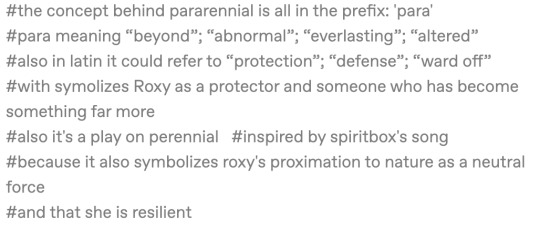
a little meta on the url :3
Transcription:
#the concept behind pararennial is all in the prefix: 'para'
#para meaning "beyond"; "abnormal"; "everlasting"; "altered"
#also in latin it could refer to "protection"; "defense"; "ward off"
#which symbolizes Roxy as a protector and someone who has become something far more
#also it's a play on perennial #inspired by spiritbox's song
#because it also symbolizes roxy's proximation to nature as a neutral force
#and that she is resilient
#just realized a few typos in the screen shot#lol#classic chilla#‵ *.: ⚘ :.*・❨ 𝐦𝐞𝐭𝐚 ❩・ ⏤ i’m still sinking as i swim in my continual condition. ′
3 notes
·
View notes
Photo
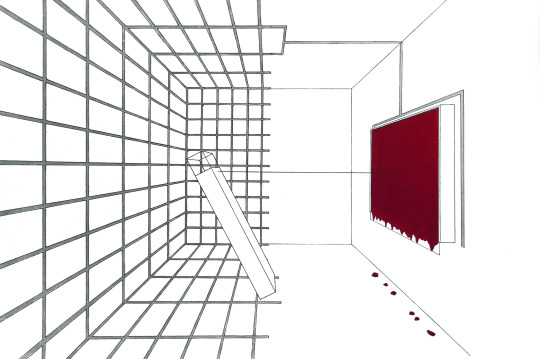
Patrick Laumond : Venice Biennale 2022 - European Cultural Centre of Italy (Palazzo Bembo)
MetaHism. An attempt to expand the possible
Patrick Laumond's work appears to derive from the plastic qualities and language of minimalism and conceptualism, born in reaction to the pictorial lyricism of expressionism. Rather than a profusion of colours and figurative and narrative tendencies, Laumond's installations are a priori embodied in abstraction, but also in the rigour and the coolness of an immaculate white. The forms are geometric, the lines straight, regular and homogeneous. The tensions and obliques underline an operative dynamic, at once mathematical, structural, even universal. However, unlike the leading exponents of Minimalism, such as Malevich's Suprematism or Mondrian's Neoplasticism, Laumond expresses no desire to strip life of life, that is to say, the sensitive and subjective part of the world, in order to reveal a phantasmal essence.
Initiator of metaHism, whose prefix META denotes the Whole, ISM its own artistic trend and H, the eighth letter of the alphabet, an infinite movement symbolised by the lemniscate ∞, Laumond does not seek to formalise an art deprived of sentiment which would flirt, as was the case in the last century, with the totalitarian overtones and masculine values of modernity. Rather, in this almost tautological paradigm, we find the desire to inscribe an irresistible flaw, thus elevating contingency, accident and tilting to the rank of indispensable partners. The motif of the grid, driven by a supposed purity, neutrality and orderliness of things, will thus always be countered by a stain, drips or fractures. If Universal Concordance seems a distant evocation of the Minimalist vocabulary, with its pared-down forms, its monochromes and its utopias of metaphysical transcendence, it is ultimately the distortions of space, time and consciousness that retain the artist. Because if the matrix grid functions in a spatial and temporal manner, with its Cartesian coordinates x, y, z and its temporal reference t, for Laumond, it is the means by which consciousness reconnects to the multiple dimensions of reality, rather than repressing them. Embedded in rigid frameworks, his work constantly tends to resist the measure of an inflated rationality that detaches us from the sensitive world. In this way, modernist and Western considerations are decentred in favour of notions that privilege movement over structure, relationship over terms, contingency over necessity, otherness over identity. Rather than advocating frontality, modularity or repetition, his installations summon chaos through multiple ramifications and connections, where everything seems to be linked by a thin thread.
In this sense, metaHism is an invitation to multiply perspectives and to embrace complexity. For if for a Westerner, consciousness is always a mental phenomenon: "I think, therefore I am", it is because he apprehends the world only through his unique point of view, according to the symbolic model of the linear perspective that placed him at the centre of the world. By multiplying the focal points, a whole spectrum of consciousnesses is offered to us: animal, vegetable, cellular, molecular or atomic. Mental consciousness is only a human range that does not exhaust the gradation of possible consciousnesses, just as human sight does not exhaust all the gradations of colour nor does hearing those of sound. There is thus a range of consciousnesses, supramental and subramental, inaccessible to the human being, which in fact appear to be impossible, invisible or unconscious. In this way, metaHism is an attempt to reconcile the dichotomies laid down by modernity, and to include the various modes of existence that populate the world. As a result, it is no longer time and space that are the framework of phenomena, but bodies and the imperceptible interactions that influence them, as Einstein foresaw in general relativity. To grasp metaHism, we will therefore have to put on the glasses of a Möbius strip and accept that there is no longer linear or causal time, top or bottom, interiority or exteriority, order or disorder, but an intermingling of all possibilities, of which contingency is the name.
Marion Zilio, Art critic and Curator & Aude Tournaye, Art Critic and Translator.
18 notes
·
View notes
Note
What titles do Raine and X’khal use? How did they get them and why are they important to them?
There are two answers to this question - the meta answer, and the in-universe canon answer.
Meta first!
For a long time, Raine used the title of the Silver Fuller, inherited from Haurchefant after the events at the Vault. That didn't change until midway through Endwalker; since then, she's used Shepherd to the Stars. This is a title she originally earned during Shadowbringers, but which took on additional meaning for her after she traveled to Elpis.
Herein I commit the chronicle of the traveler. Shepherd to the stars in the dark. Though the world be sundered and our souls set adrift, where you walk, my dearest friend, fate shall surely follow.
These words came from Hades, spoken to and about his friend and lover, Hero, who held the seat of Azem and of whose soul Raine is a reborn fragment. The events of Endwalker gave Raine a very potent appreciation for what that meant.
As for X'khal... currently he uses The End of Ascalon, and before that, Unbeliever. Both of these titles came from his interactions with Archbishop Thordan in Heavensward - the latter from their first confrontation, and the former from their last one in which X'khal killed Thordan and the Heavens' Ward. GOOD TIMES. Needless to say, those events had an impact on X'khal he has yet to overcome.
But this is strictly meta. Raine hasn't confided in many people about her connection to Azem and everything that comes with that. She could use Haurchefant's title formally, I don't think anyone would object, but I don't think she's really comfortable with doing so - certainly not long term.
As far as titles she actually uses - or more often are simply applied to her - in her in-universe canon, there are a few. Warrior of Light, Azure Dragoon, Champion of Eorzea, Sister of Ash, sylph-friend, honorary Knight of House Fortemps, Warrior of Darkness. These are all titles she's known by, earned via her actions and accomplishments. She's not the only Azure Dragoon, of course (hi Estinien!) or even the only Warrior of Light; there are others who received Hydaelyn's blessing and earned acclaim with their own exploits around Eorzea.
If there's an epithet that's hers alone, something that will be passed down in history as associated with her name... well, there are two. In Ishgard, she's Raine of the Silver Lining. Elsewhere across the world, she's Raine of the First Light. The significance is the same for both: she's a hope bringer, the gleam of sunlight breaking through the clouds or the first rays of dawn after a long night.
(Of the Silver Lining is of course an in-game title, and one you get well before Of the Silver Fuller, but for Raine I like to imagine that it came into use as an adaptation of Haurchefant's knightly epithet once Raine declined to take it up in full.)
As for X'khal, he resists public attention enough that he hasn't really picked up anything beyond the general title of "Warrior of Light." Yet, anyway. That will no doubt change eventually; perhaps I'll revisit the subject at a later. It is worth noting that "Leonhart" is not a family name, though - he's a Seeker of the Sun, albeit with no ties to the X clan beyond the prefix. He picked it up during his time with the Bozjan resistance for his apparent lack of fear, which was honestly more a disregard for his own survival because turns out being a child soldier kind of fucks you up.
#ffxiv#oc: raine d'arcy#oc: x'khal leonhart#heavensward#shadowbringers#endwalker#fun times!#thank you for the ask ❤️
3 notes
·
View notes
Text
I just posted the first chapter of the fic! My user name is Arrows_of_Artemis and the fic is named Meta: A prefix meaning to change or transform! Check it out!
Everyone thank @mac-cheez for beta reading it for me!
#tim drake#red robin#robin#rr#chaotic tim drake#batfam#meta!tim#my au#unhinged tim drake#ao3#ao3 fanfic#fanfic
102 notes
·
View notes
Text
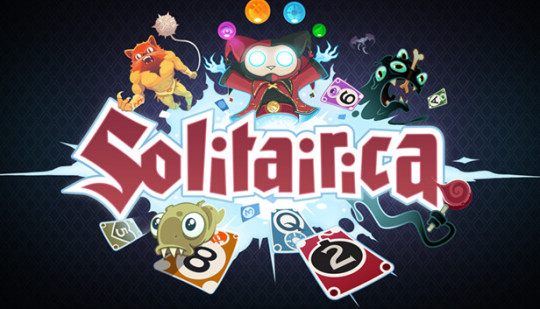
Solitairica
Developer: Righteous Hammer Games
Publisher: Righteous Hammer Games
Rrp: £6.99 (Steam) and £7.99 (Epic Games)
Released: 31st May 2016
Available on: Steam and Epic
Played Using: Mouse
Approximate game length: 10 Hours
A solitare roguelite RPG. Let those words sink in. This game somehow uses solitare as its main mechanic in an RPG roguelite, and y'know what.... IT WORKS! Colour me surprised.
The game uses a somewhat modified version of solitare in the rather than try to create stacks of cards in the same suit you instead are trying to eliminate the stacks that are laid before you. Whatever card you have drawn (and you draw an new one every turn) you can eliminate any card that is the next number up or down in sequence which in turn replaces your originally drawn card. So if you draw a 7 you can eliminate either 6 or 8, lets say you choose to eliminate the 6, the 6 is now your card and you can now eliminate any single 5 or 7 that you see.
Between your turns the enemy takes its turn and performs an action, sometimes this is an attack other times its something that affects the cards that are in the play area. The aim is to remove every card before the enemy reduces you health to 0.
Cards come in four suits; attack, defence, agility and willpower. These suits relate to the type of energy that they will give you should you eliminate them. You also gain a point of energy every time you draw a card. The energy that you have collected is shown in the bottom right of the screen.
This energy is used to cast spells that are shown on the left side of the screen these spells each have different effects, such as attack spells (that are always red/orange) allow you to remove cards.
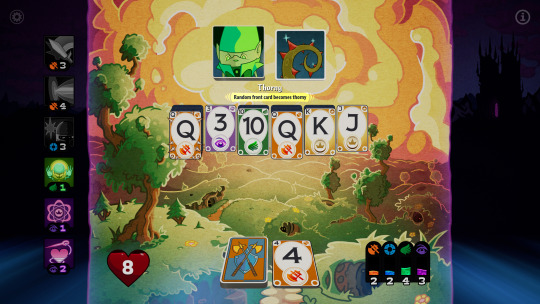
Many enemies have a random descriptors attached to their name that adds special rules, for example; The colossal prefix will give that enemy two extra stacks of cards.
You gain money by defeating enemies, collecting cards with the coin suit or by having a card streak of 8 or more cards. This money is used in the store that you can visit between each battle where you can buy new spells and items. The items and spells that are available change between combats so you can choose to spend ten gold to hold an item until the next time you can enter. You can also purchase an item called a celestial hourglass from the store, this item allows you to try a fight again should you lose. The catch is that its quite expensive although it can be bought with either gold or wildstone.
Wildstone is a separate currency to gold that can only be spent on improving your deck, unlocking items slots or unlocking new decks. You gain wildstone each time you die with a greater amount being given the further you make it in a run. You can also occasionally find a wildstone card while in combat which will also grant a small amount. It should be noted that wildstone cannot be purchased by any means as there are no microtransactions in this game.
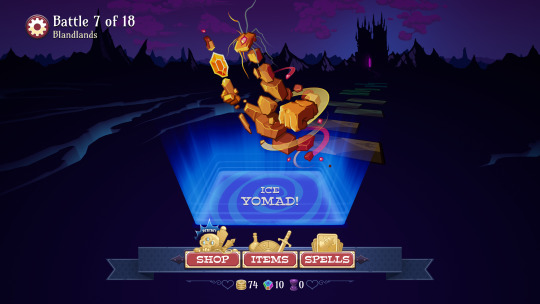
As is usually the case with roguelites when you die you lose all the spells, items and gold you collected on you run, you do however get to keep your wildstone allowing meta-progression.
I'll be honest I probably would never have bothered with this game if it hadn't have been for Epic Games Store giving it away a while ago. That being said I honestly think this game is well worth the asking price as I really enjoyed it.
If this appeals to you perhaps try;
Runespell Overture
Dicey Dungeons
Slay the Spire
#solitairica#righteous hammer games#game review#games review#game reviews#games reviews#video games#video game#video gaming#roguelite#rpg#solitaire#card game#indie#indie games#indie game
5 notes
·
View notes
Text
About Roboska
I have not abandoned it. I'm too determined to abandon it. Hell, I'll even sell me soul to Satan if he lets me complete this project before I die.
So what the hell am I talking about? Well...
Roboska is a game series that I'm planning on making over the next few...decades. Yeah...this is going to take a while. I don't mind though as this is my magnum opus, my dream game series, the only reason I exist in this world, the thing I really want to make and will do anything to be able to complete it in my vision. I've been working on it (mainly character designs and writing) since I was 12 and it's evolved from just a little animation series I had planned for 2021, to a whole meta multiverse kind of thing. Is it ambitious? Absolutely. However you'll see why I care so damn much about this thing once it actually starts to come out. This will be the highlight of my game development career and I will only be known as "that girl who made roboska" from that day forward.
The first one is "The Sapphic Princess", which I've already started. I've chucked little bits of lore into some of my game jam games so technically the first one is some 400 word visual novel I made in 2 days...Anyway, I tried making this idea back in 2022 but I lost motivation due to the limitations I gave myself. I still released it under the name "Sci-Fi RaiRoboska!?". It sucks and it takes up way too much memory thanks to me being a stubborn little brat who decided to code the entire thing in Scratch. To be fair, this was made before I knew what Godot was. The art is okay, the music is fine, the story really needs some work, overall it's the disappointment of the family and will not be considered canon. I keep it up though as it's part of history and also it explains what I was doing for 10 months of my life. Originally roboska was just that (and 2 squeals I had planned, which I still do to a degree) but it's evolved since then and has crossed over with some other projects that I've abandoned.
The Sapphic Princess (or LV for short) is the indirect prequel to the big one: Roboska: kanjou! It's a remake of Sci-Fi RaiRoboska but with much more content in, way more horror and 4th wall breaks, voice acting, 3D animations and also the planned squeal shoved in as well to make the ending more satisfying. It's in a completely different world with the main link between the 2 being the roboska experiments. Same experiment, different people testing on different worlds. Same with the 3rd one: Roboska: owari. Although that one takes place in the same world as kanjou, just with a different god with different motives testing it. I don't want to go into too much detail, but I've been tweaking and perfecting the story for 3 years now, and will continue to do so. I upload almost every piece of digital art that I do so here's a bunch of roboska art from both LV and kanjou (some of it is outdated).
In conclusion: I did not abandon roboska as a whole, just Sci-Fi RaiRoboska. It has evolved into something much greater than I envisioned and I hope you will enjoy it as much as I enjoy making it.
Also "roboska" doesn't mean anything, it's just a bunch of gibberish I chucked together back in 2021 that sounded cool and I've gotten too attached to it. I'll think of some kind of lore meaning. The closest I've gotten is that the prefix "robo-" means "automation" and suka in japanese (ska is spelt suka in katakana) means a bunch of random stuff according to google:
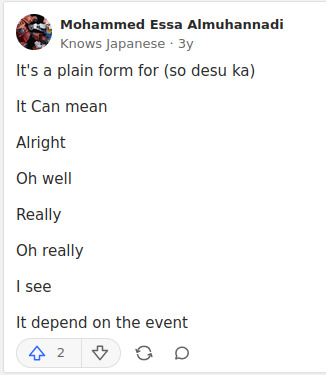

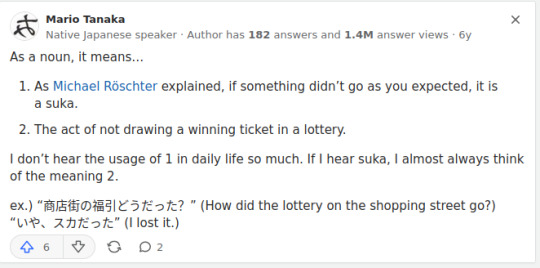
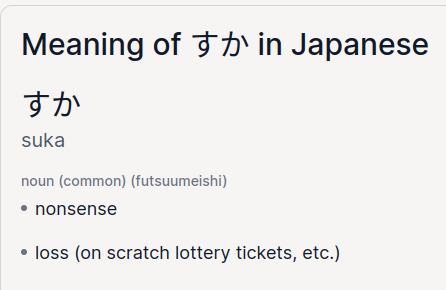
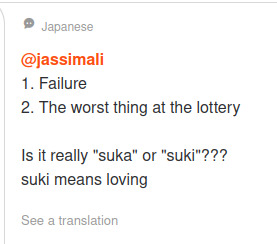
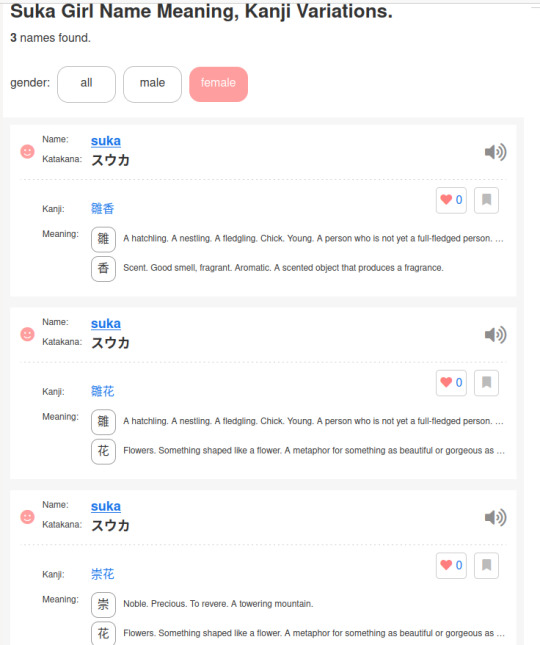
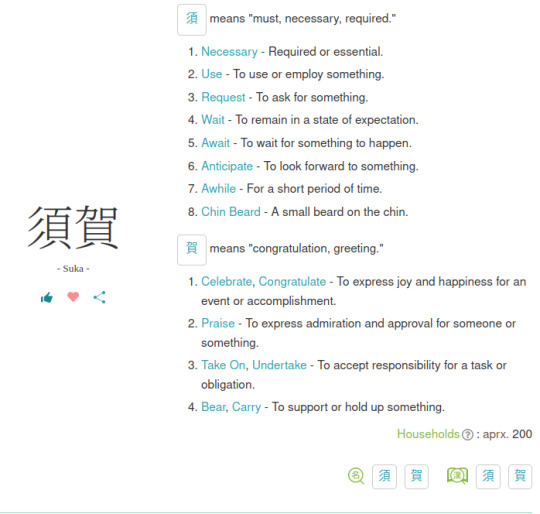
It's also a russian swear word apparently.
I guess any of these translations could work is you make it very abstract (or if roboska is short for a longer phrase). Roboska is used to describe a pre-destined event where an alien species called "emeraldeyes" directly communicate with humans to "test their limits of imorality" when given the opportunity to screw up fictional lives and not have to face any real world consequences. The idea of losing the lottery could work in the sense of the fictional characters having bad luck for being born just to suffer. I'm not too sure of the name meaning just yet. I'll think of something...eventually. It's a little annoying how tumblr says the username "roboska" is already taken so I had to name the LV blog "roboska-LV" which means I have to keep changing it every time I start work on the next one and make all the previous links to it not work anymore.
#roboska#roboska: kanjou#Roboska: kanjou!#roboska: lv#the sapphic princess#game development#game dev#indie game dev#game#games#series#japanese#magnum opus
1 note
·
View note